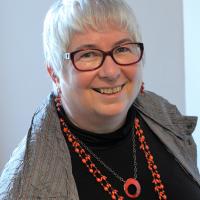GSLIS doctoral students Ruohua Han, Emily Lawrence, and Beth Strickland participated in a panel discussion at the 2016 Personal Digital Archiving conference, hosted by the University of Michigan Library on May 12-14.
The panel, “Memory and Personal Archiving,” was moderated by GSLIS Associate Professor Lori Kendall. Presentations included:
"Scrapbooking Personal Memories: Traditional vs. Digital," by Ruohua Han
In this presentation I aim to distill the characteristics of digital scrapbooking and its end product, digital scrapbooks, by comparing them to traditional scrapbooking and scrapbooks through three lenses closely connected to their abilities and features in recording and sharing personal memory: senses (sight, hearing, taste, smell, and touch), time, and space. Through this analysis, I conclude that although digital scrapbooking retains the essential function of scrapbooking and is representative of the needs and possibilities of a digital age of memory keeping, some important features present in traditional scrapbooking—the sensual and evocative elements in particular—may be lost to a certain degree.
"A Family Archive in Podcast Form," by Emily Lawrence
Nearly twenty years ago, my family was in a car accident on our way to the wedding of two close friends. This project represents my attempt to construct and preserve a collective, multi-voiced story of that past familial trauma. The resultant four-episode podcast (titled "Family Lucida"—a play on Roland Barthes’ Camera Lucida) documents the day of the accident in an impressionistic narrative constructed from personal accounts. Whereas some digital memory and oral history projects constitute fact-finding missions, the primary goal of this podcast is not to uncover historical truth. It is, rather, to take part in an artistic exercise geared towards generating an unorthodox family archive, one that exemplifies the fundamental instability of memory just as it valorizes remembrance in the present.
"MyLifeBits and Conceptions of Memory," by Beth Strickland
In this presentation, I will examine assumptions about memory in the MyLifeBits digital memory system. I will explore system benefits and the way those complement bio-memory, as well as challenges, such as retrieval issues. I will conclude by considering what it means to digitally capture a moment, versus remembering an experience through the retrieval of digital items, and what this suggests for our understanding of what constitutes memory.
